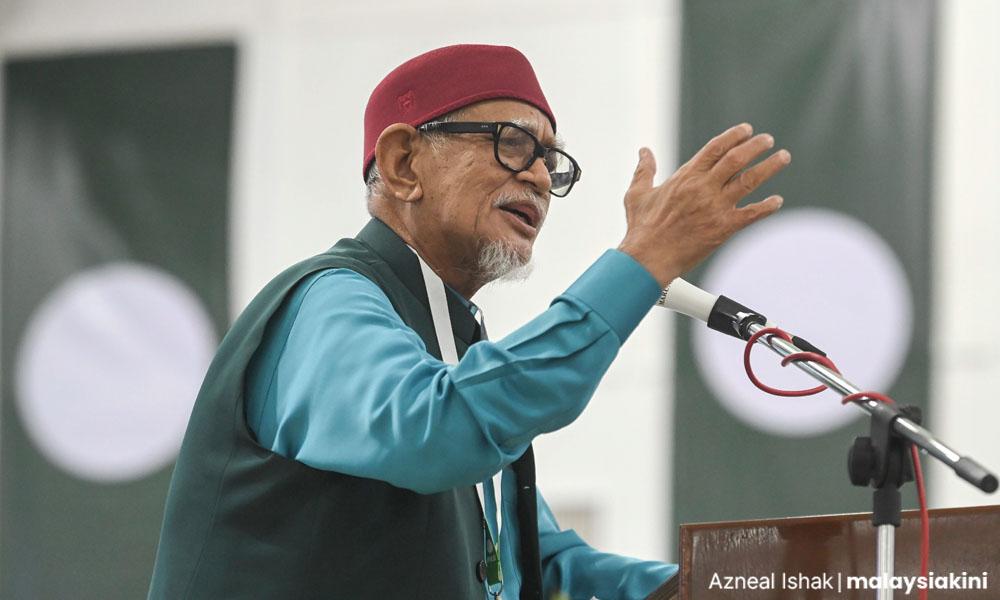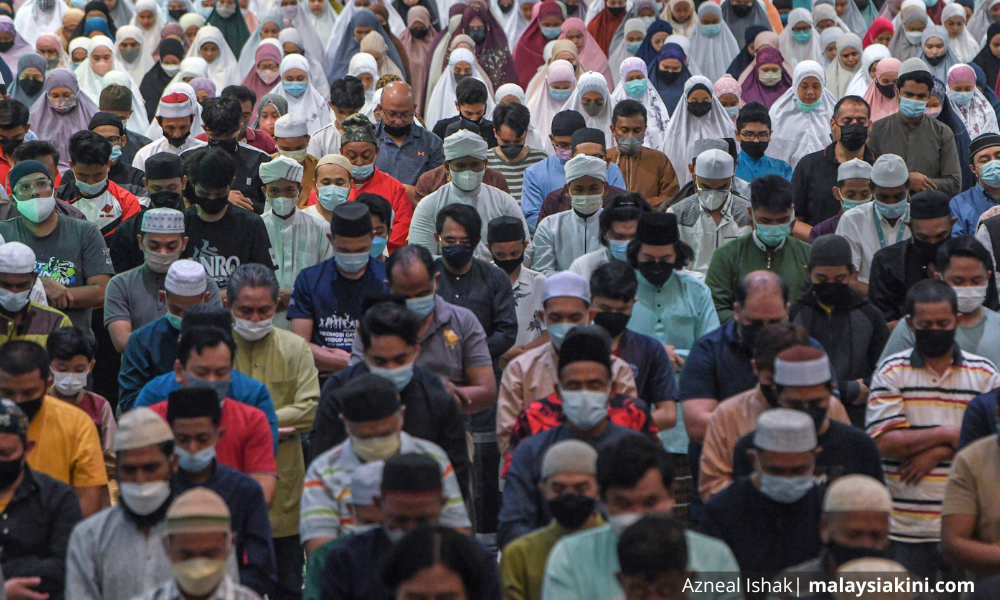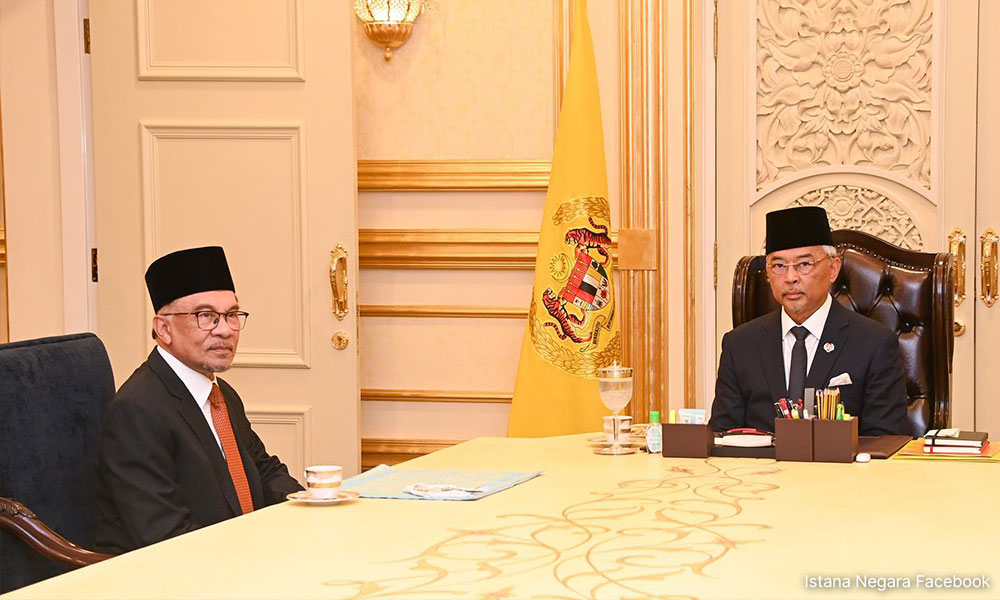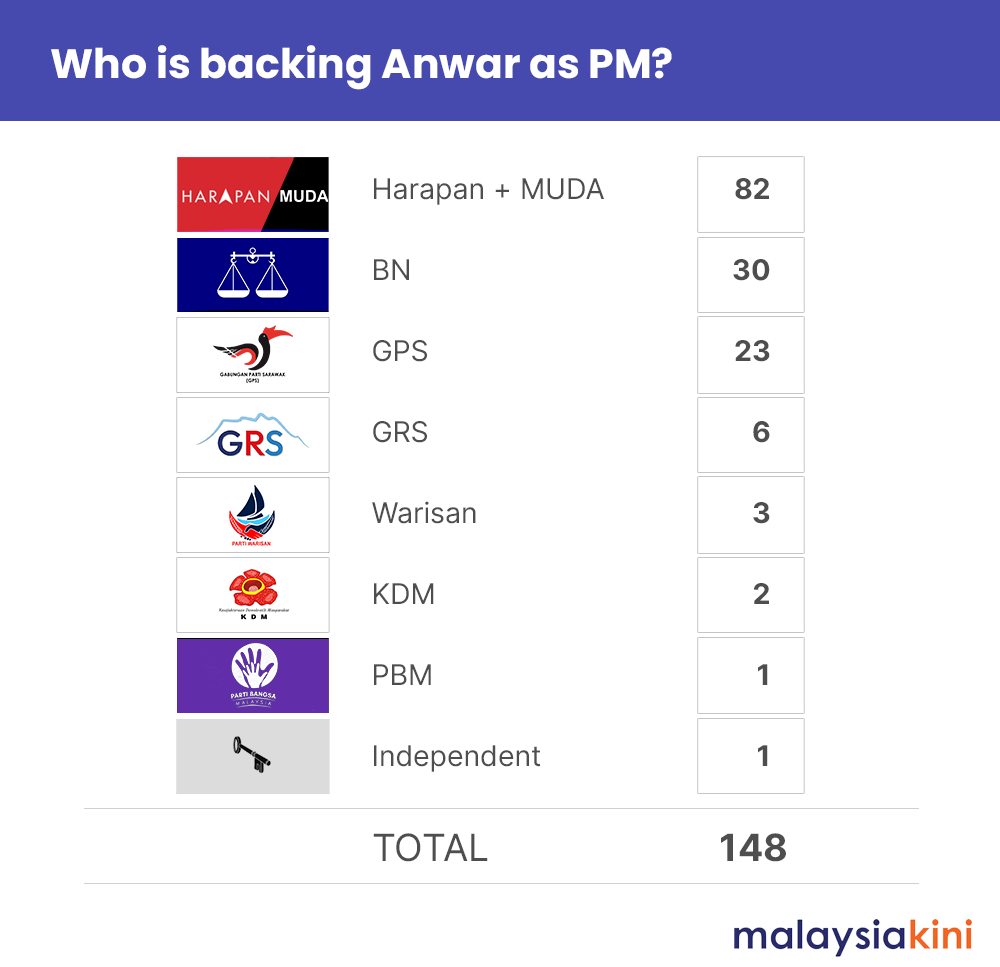Since Prime Minister Anwar Ibrahim took his oath of office on Nov 24, there have been claims by influential figures that his government is dominated by non-Malays and non-Muslims.
This, according to fugitive blogger Raja Petra Kamaruddin, is a recipe for ethnic unrest, with the opposition bench made up almost entirely of Malay and Muslim MPs.
He said as it is, Malays now view the new government as a “Chinese government”, with almost all Chinese MPs sitting in the Pakatan Harapan-led government.
He also said this shows the government is not a “unity government” but a “polarised government”, which in Bahasa Malaysia he called kerajaan perkauman (racist government).
Similarly, PAS president Abdul Hadi Awang said the new government is dominated by non-Muslims.
He said this is the reason why Perikatan Nasional (PN) turned down the offer to join the government, also claiming that 80 percent of Malays voted for PN.

Hadi also termed the government a “minority government” as a result.
He added that the “non-Muslim” party DAP has more say in a Harapan-led government because the party has more MPs than its partners.
Malaysiakini reviews the ethnic and religious composition of MPs to see if these claims check out.
Is the new government a “Chinese government”?
Of the 148 MPs supporting Anwar as MP, Malays make up the most with 50 being ethnic Malay.
This is followed by Chinese MPs at 43, Muslim bumiputera from East Malaysia (27), non-Muslim bumiputera from East Malaysia (16), and Indian or others (12).
However, according to the latest demographic statistics released by the Department of Statistics Malaysia (DOSM) in July, the proportion of ethnic Chinese and Indian MPs in the government slightly outweighs the proportion of ethnic Chinese and Indian Malaysians to Malaysians as a whole.
A total of 29 percent of government MPs are ethnic Chinese, while, according to the DOSM, 22.8 percent of Malaysians are of this ethnicity.
Even so, the new government is still not a “Chinese-dominated” government because there are 105 non-Chinese MPs, more than double the number of Chinese MPs.
Therefore, it is not true to say the government is “Chinese-dominated”.
Is it a non-Muslim-dominated government?
The number of Muslim and non-Muslim MPs on the government side is actually balanced.
Muslim MPs in government make up 52 percent while non-Muslims 48 percent.

As such, it is not true that the government is dominated by non-Muslims.
So which community “dominates” the government?
The bumiputera make up the largest group of MPs in government.
Split between bumiputera and non-bumiputera, the ratio is 63 percent bumiputera and 37 percent non-bumiputera.
The national demographics show that 70 percent of Malaysian citizens are bumiputera.
Is the opposition bench exclusively Malay/Muslim?
Technically, some of them are East Malaysian bumiputera and not Malay.
However, an overwhelming 92 percent of the 73 MPs on the opposition bench are Malay and Muslim.
Only two opposition MPs, or about three percent of the bench, are not Muslim.
As such, it is correct to say that the opposition bench is almost exclusively Malay and Muslim.
Is it true that ‘non-Muslim’ party DAP dominates Pakatan Harapan?
DAP is a secular party, however, all but three of its 40 MPs are not Muslims.
It is also the party with the most MPs in Harapan, followed by PKR with 31 MPs, and Amanah holding eight parliamentary seats.
A total of 37 percent of Harapan MPs are Muslims.
Unity government or “racist government”?
The Anwar administration is frequently referred to as a “unity government” after it was formed following mediation by the Agong.
This is likely because the Agong called for the formation of a unity government after a bruising 15th general election.

However, technically, it is not a “national unity government” as generally seen formed around the world during times of crisis.
In these instances, a “national unity government” includes all political parties in the legislature. This means there is no opposition bench.
In the Malaysian case, the 73 PN MPs make up the opposition bench, so it is not technically a unity government. What it is, however, is a coalition government led by Anwar.
Harapan with 82 seats is likely to have the most sway, but the new PM is insistent that this is not a Harapan government, but a coalition government.
That said, the fact that it is not a unity government does not necessarily make it a “racist government”.
In his video, Raja Petra repeatedly stressed that the Anwar-led government is “not a unity government but a polarised government or kerajaan perkauman,” as if these concepts are diametrically opposite of each other.
This is factually untrue because the term “unity” in “unity government” does not refer to racial unity.
As such, even if it is not technically a unity government it does not automatically make it a “kerajaan perkauman (racist government)”.
Neither is it necessarily a “polarised government” - the term he used when referring to it in English - because the ethnic composition is somewhat reflective of the bumiputera to non-bumiputera ratio of the nation.
But it is arguably an ethnically polarised Dewan Rakyat, with the opposition made up almost entirely of Malay Muslims.
Is it a “minority government” as claimed by Hadi?
It is not a minority government, as defined by political science textbooks; that is, a government which has the support of less than half of the MPs.
To date, 148 MPs support the government led by Anwar. This means he has support from two-thirds of the House.

But is he right that 80 percent of Malays support PN?
Discrete voting data from the 15th general election is still being processed by the Election Commission. It is expected to be made available for purchase by the public next month.
However, political analyst Bridget Welsh’s recent analysis of voting patterns has been oft-repeated to show how Malay voters cast their ballots in GE15.
In her analysis, Welsh said Harapan garnered support from 11 percent of Malay voters, PN received 54 percent while Umno/BN took about a third of Malay votes.
Her analysis has been repeated by PN leaders, but disputed by Harapan leaders who question her methodology given that discrete data is still not available.
MALAYSIAKINI is part of a fact-checking alliance, JomCheck, made up of media houses, academia, and civil society.
Through JomCheck, Malaysians are able to submit requests to fact-check a claim by sending a WhatsApp message to the tipline at 017-477 6659 (WhatsApp text only, no calls) or via this link. - Mkini




No comments:
Post a Comment
Note: Only a member of this blog may post a comment.